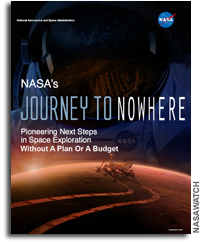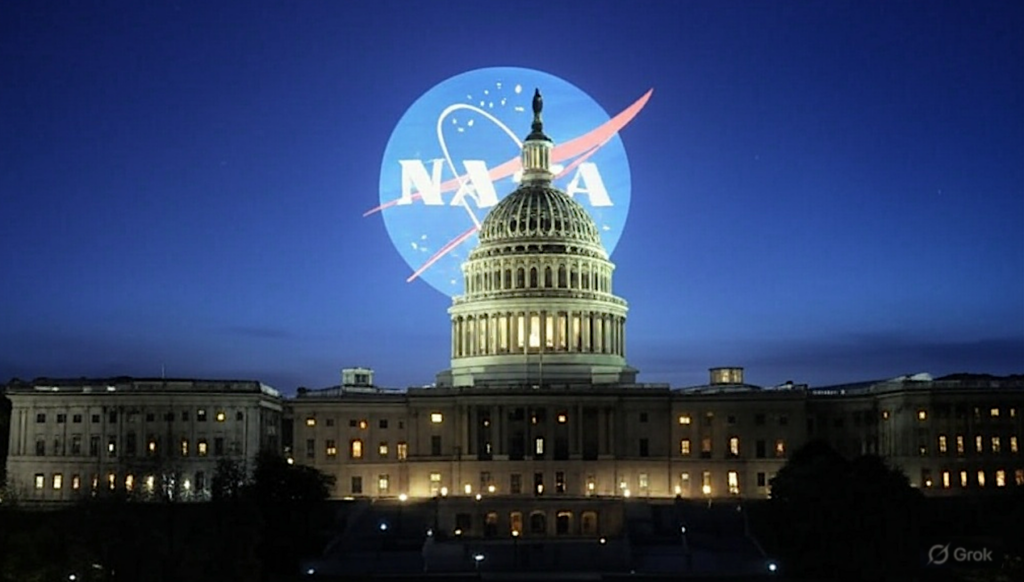Space Policy White Paper = Shopping List For The Journey to Nowhere

 Keith’s note: Last week a group of space-related organizations rented the National Press Club so they could announce a white paper on space policy. Why bother? Space is not going to be an issue in the 2016 campaign.
Keith’s note: Last week a group of space-related organizations rented the National Press Club so they could announce a white paper on space policy. Why bother? Space is not going to be an issue in the 2016 campaign.
At the press event Elliot Pulham from The Space Foundation said “We thought it would be a good time to have a platform of information out there that all candidates could refer to, learn from and take to heart as they plan their campaigns” but moments later he also said “To some extent, the purpose of this is not to have space become a big presidential issue”. Pulham added “Let’s not undo anything.” Sandy Magnus from the AIAA said that this coalition wanted to take the issue of space policy “off the table” but at the same time she said that this group wants to “stress the importance” of space.
Such is the problem with these sort of documents from the space community. On one hand the space groups want to have a say in the political decisions that affect their members (and donors). But on the other hand they’d rather not have the politicians pay too much attention to space such that the current status quo is not upset. In other words “write us the checks but don’t rock the boat” – or more bluntly “look but don’t touch”. This is, at best, naive thinking on the part of the space community.
If you read the white paper it becomes immediately apparent that this coalition wants everything that they are doing to be supported and in some cases, they want even more money. They also want a stable funding environment (makes sense). The two main programs being supported by this coalition are SLS/Orion and Commercial Crew and Cargo with gratuitous mention of other projects that are important to the members of this coalition. Indeed that is all that this white paper is actually about: supporting specific big aerospace contracts. There is no similarly identified support for specific space, planetary, and earth science. Small wonder that the Planetary Society, American Astronomical Society, the American Geophysical Union, et al are not among the members of this coalition.
While a lot of prominent names are affixed to this white paper it is clearly being driven by the so-called “four amigos”: Lockheed Martin, Boeing, Aerojet Rocketdyne, and Orbital ATK – the builders of SLS/Orion. Look at the organizations listed and ponder who the prime donors/members are. Its not that hard to fill in the blanks amidst the smoke and mirrors. No surprise folks – this is how these things always work.
So, at the onset, this partial coalition of space organizations purports to be some sort of national consensus but deliberately ignores a substantial portion of what America spends its money on in space. And yet they want this white paper to be some sort of user guide for campaigns to use when it comes to space. I am not sure how useful such a guide is when several important chapters are deliberately left out.
But to the point as to whether space is even going to be an issue such that some campaign staffer needs to even bother to generate a position paper, well, it depends on who is doing what in the campaign. The space policy circle is rather small and everyone knows everyone else. As campaign season starts every 4 years this community starts to partially parse itself between overt Democrats and Republicans – with most of the community hovering in between. I am not going to name names since that just fuels rumors that have more to do with personalities than actual policies.
On the Democratic side, the players in space policy are well known and, barring an upset wherein Bernie Sanders gets the nomination, the issue of space under Hillary Clinton is more or less settled. The Democratic players are against SLS and for commercial crew and cargo. They support earth/climate science – as well as space/planetary science, education, technology development, and tend to want to push NASA to be more relevant to a broader range of societal factors.
On the Republican side it is a little more confusing. As with the Democrats there is a core group of usual suspects that end up in the periphery of campaign policy circles. If a more mainstream candidate wins the nomination, you’ll see that crowd show more of a focus on SLS and Orion, somewhat less overt interest in commercial crew and cargo, and then minimal overt support for all the science stuff other than to say that it is important. If the nominee is further to the right (Cruz) then the policy will go deep into being anti-earth/climate research at NASA and more stridently pro-SLS/Orion and dismissive of commercial crew/cargo. If the nominee is a certain billionaire, well, he thinks fixing potholes is a lot more important. And to be quite honest, given NASA’s chronic inability to explain itself these past decades, it would be hard to argue to the electorate that space stuff is more important than fixing the crumbling infrastructure that voters are confronted with every day on their way to work.
In a nutshell, if a campaign feels the need to address space as an issue – and this white paper agrees with what they want to say – even if only partially – then they will cite it as some sort of gold standard. If they do not agree with the white paper’s verbiage then they will ignore it. And if they need their own validation they will go find some former astronauts and NASA luminaries to sign off on their own position paper. Given the small circle of people that comprises space policy community, that input has already been made to some extent in this white paper.
The saddest part of this effort is that the people involved actually think it (they) will have an impact. They haven’t had an impact before, why would they have one now? Space is a niche issue – on a good day. This effort is simply an effort to recycle the status quo. While the white paper makes quick mention of destinations in space (Moon, Mars), and cites standard buzz words and verbiage about sexy topics in technology, there is no discussion whatsoever about the lack of – or the need for – a clear space policy or strategy. All this white paper does is complain that NASA needs more money to do the same things that it has been doing without even the slightest interest in having an overarching national policy that resonates with the actual needs of the electorate – and the nation.
Until the space community actually manages to find a compelling reason to exist other than securing paychecks for its contractors and pet projects it will be relegated to the stop-and-go, flat budget, meandering path that it is currently stuck with.
– White Paper Lays Out Steps to Ensure U.S. Leadership in Space, AIAA
– ASAP: NASA Has No Plan or Firm Funding For Its #JourneyToMars
– Kicking The Can Down the Road to Mars, earlier post
– NASA Begins Its Journey To Nowhere, earlier post
– Yet Another NASA Mars “Plan” Without A Plan – or a Budget, earlier post
– NASA’s Strategic Plan Isn’t Strategic – or a Plan, earlier post
– Charlie Bolden’s Meandering Strategic Plans, earlier post








Good points. I agree with most of what you wrote but this:
“The saddest part of this effort is that the people involved actually think it (they) will have an impact. They haven’t had an impact before, why would they have one now? “
And this:
“While a lot of prominent names are affixed to this white paper it is clearly being driven by the so-called “four amigos”: Lockheed Martin, Boeing, Aerojet Rocketdyne, and Orbital ATK – the builders of SLS/Orion. Look at the organizations listed and ponder who the prime donors/members are. Its not that hard to fill in the blanks amidst the smoke and mirrors. No surprise folks – this is how these things always work.”
The fact we still are saddled with those two boondoggles, SLS and Orion, gives the appearance that they do have an impact, if only to keep the rice flowing to the four amigos rices bowls.
So there seems to be enough impact from a few to keep the monster funded.
The impact is NONE (10X more expensive, no new markets, no spinoffs, no challenges solved, alternatives ignored). The impact however, is also HUGE.
“When we become afraid to take these great big risks, we stop inspiring people, we stop achieving things. The biggest nightmare scenario is that we will not have what it takes to solve the really big challenges” — Moonshot Thinking.
Shuttle lost out to Titan unless it flew 28 times per year–it was built anyway. Nixon added solids ( a major mistake). 2000s Congress cast aside depot centric for shuttle derived HLV with a ’60 day’ study. Ares I could not loft Orion, but specified 70 and 130 mT to retain all the engine development programs (Exploration?!). Vulcan v0 needs 10 flights a year to achieve 100M/ea, which is more expensive than the expendable Falcon. Huh? See a pattern here on alternatives? Its not entirely the private companies fault. Who are the shysters?
The white paper is a reflection of decades of failed policies that focus on short term gains by obtaining votes from the base, at the expense of the environment, the next generation, the next challenge. It is a reflection of leaving numerous viable options off the table and telling the voters what to falsely believe. It’s a reflection that they no longer have the ‘experience’ to tell others to pull yourselves up from the bootstraps–resorting to micro marketing and insults. It’s a reflection that they now may not have what it takes to solve the really big challenges by repeating the same failed policies without any new ideas, but cleverly packaged to retain special interest demands–with delay tactics on changes. It’s a reflection of decades of NOT seeking good policy– it’s therefore a HUGE impact.
Its a reflection of the false American Dream–to make enough money so you do not have to ‘work’ anymore. A rocket and capsule with no $$ to address the challenges nor missions. Success? http://dilbert.com/strip/19…
What might make a difference and be influential would be if NASA came up with a meaningful and reasonable strategy and plan. Journey to Mars doesn’t pass the sanity check. NASA ought to be aiming for decadal targets. Instead, NASAs goal is to fund and build a manned Orion flight. Then they throw that vehicle away presumably to build another one. And they keep lying, telling everyone it is going to Mars. But Orion was designed to go no further than the Moon. No sanity check passed. In fact it makes most of us look at the NASA management and their big 4 amigo benefactors as shysters.
If NASA cannot step up to the plate (actually many parts can) then “You’re Fired” and bring back RIFWatch.
NASA has plenty of good, capable people. They have as good backgrounds and abilities as anyone else in the industry.
The issue is with the leadership and the lack of it. They haven put together a bona fide plan. A lot of the leaders have now demonstrated they do not have the appropriate backgrounds, education or abilities;
If you’d looked at their backgrounds as they were appointed, especially when you saw they were ALL out of operations when this is a development effort, you would have wondered what was going on, Now, a decade later, the proof is apparent by what they have not accomplished.
“Journey to Mars”
I’ve posted before that I think reason the Moon is never discussed is because if it was a goal, then need to come up with some real money now for a transfer stage and a lander (I don’t know specifics but I remembered Altair lander disappeared from Constellation program when there were budget and technical problems). Making Mars for goal is so you can defer costs of transfer stage and lander to some other smucks 20 years into the future.
I’m thinking about Tom Kelly’s book “Moon Lander” and the effort it took to make it happen. There is probably a lot that has to be re-learned, and any future lunar lander for humans should have greater capacity which is even more work (and money).
“I don’t know specifics but I remembered Altair lander disappeared from
Constellation program when there were budget and technical problems”
Actually Altair never had the chance to get budget or technical problems. Per the schedule circa 2005-2006, it was to be part of the next phase of Constellation and was to be RFP’ed in 2014. When Obama cancelled Constellation in 2010, Altair was stillborn.
Incidentally, this is also why Orion is only lunar capable. The original contract for it was lunar only by design. The Mars capable version was to come during a later phase, which, of course, disappeared in 2010 along with the rest of Constellation.
“RFP’ed in 2014”
That seems very late to start working on Altair, I think all those elements from capsule to lander should be developed at same time as a system. But then Constellation was Apollo 2.0 which was a departure from original VSE intentions (or at least that’s what we all argue about on the forums).
I remember during Augustine Commision II hearings and Sally Ride said of Apollo we had this huge system that we threw away and started all over with Shuttle. She followed that with now we are going to throw away Shuttle for a new system. I cannot remember her exact words but Ride pointed out these large space systems that were developed never built upon themselves for the Next Step.
I agree that 2014 was late to start the lander given the desire to land on the Moon by 2020, but that was the schedule laid out by NASA at the time.
Constellation was not Apollo 2 (if you define “Apollo” to be independent lunar missions with no view to future missions either on or beyond the Moon), though there were aspects of it that paralleled Apollo.
Because NASA was trying to fit Constellation into their “usual” budget (which is another debate in itself), the entire program from inception to Orion visiting ISS, Orion going to the Moon, developing a Moon lander, providing Mars mission support, etc was envisioned to be broken up into phases, each with its own self contained contract, but the idea being each successive phase built upon knowledge from the previous phases.
Because the early parts of the program a phase focused on ISS support (this was what the original RFP covered), followed by a return to the Moon phase (this was never RFP’ed because of Constellation’s cancellation), it does seem like its just Apollo all over again. However, there were requirements on Orion, even in the initial RFP, to be flexible enough to support future Mars missions.
At this point let me apologize for implying in my earlier message that their was going to be a Mars capable Orion later on down the Constellation road. This is not correct. The actual plan was for Orion to be flexible enough to be a crew transfer vehicle for a future “Mars Transfer Vehicle”, both transporting a crew from Earth prior to, and returning the crew to Earth after, a Mars mission.
So, while Orion was never intended to go further than the Moon, it *was* intended to support missions that went further out. I think the problem is that those aspects beyond the lunar missions were only referred to vaguely because they were so far out and NASA had no clue about the specifics. Those details were to be gained as we went along. Not arguing that was best way to go about it or not, but that was the documented plan at the time.
A final caveat is that this is all based on information straight out of the original CEV RFP documentation. I have no idea what the requirements are for the present Orion vehicle.
Interesting info. Thanx.
I think reason the Moon is never discussed is because if it was a goal, then need to come up with some real money now for a transfer stage and a lander
The reason the Moon is never discussed these days is entirely because Obama ruled it off-limits in 2010 and no one at NASA wants to offend “The Big O.” Simple as that. All this loose talk about “Journey to Mars” is what they’ve come up with to try disguising the fact they have no goal achievable on a realistic time frame or budget.
Congress could have required in legislation that NASA target the moon rather than Mars. They did not do do.
Your view is that the Democrats will glom onto private space efforts, and that the Republicans will favor a massive government program?
It’s not a partisan issue. It’s a clout issue and it will not make one bit of difference who wins the White House. Shelby is a shoe-in for re-election; Nelson isn’t running. About the only thing that could affect SLS is a Democratic take-over of the Senate, but even then clout runs deep.
About the only thing that will reverse SLS is public pressure and that won’t happen until some enterprising writers manage to spark public imagination. Not likely to happen given very positive overall economic news these days.
The Democrats could make a huge case out of SLS as an example of cronyism or whatever, but that won’t work unless the issue of Republican management of the nation’s money has come to front, and that isn’t likely because the issues are too far down in the weeds.
“Never doubt that a small group of thoughtful, committed citizens can change the world. Indeed, it is the only thing that ever has.”
— Margaret Mead.
Low cost high speed internet coverage will be the first spinoff. Lower launch costs will bolster our national defense, #2 enabling advance space assets/capabilities, #3.
Public imagination and support will then be self evident.
“Never doubt that a small group of thoughtful, committed citizens can change the world” – Sen. Shelby
Largely agree except for SLS being vulnerable to a Democratic Senate takeover. Even if the Democrats were to somehow win every Republican Congressional and Senate seat in AL, UT and CO now held by Republicans, SLS/Orion would still be secure because it’s pork. Pork is so hard to slice precisely because the getting and expanding of it is inherently bi-partisan.
That is what they said about constellation .. and venture star .. and and and
VentureStar failed for technical reasons. Constellation was not ended by Congressional action, but by executive action. Congress, looking to salvage what continued pork they could from the wreckage, fished Orion out of the rubble and then invented SLS.
Bull… the President submits a non binding budget PROPOSAL to congress. if you think the president can just put a zero on a budget proposal and can kill a program .. espescially THIS president you need some civics lessons. Congress has ignored his budgets from day one.
Obama made it clear he wouldn’t approve any bill that included Constellation funding. The Congress mooed and whined, then came back with the counter-offer of the salvaged Orion and the crippled and deformed miniature Ares V, the SLS. That was sufficient to mollify The Big O as he has far less interest in the details of space programs than in making it clear that what he says, goes. Congress got some of its desired tranche of pork. Obama got to collect Constellation’s scalp – or enough of it to make his point, anyway.
Compromise! Ain’t it great?
President Obama never threatened to veto that spending bill …
Guess I should have said that more clearly.
If commercial crew and falcon become operational the next president will form a panel or a commission or a committee and the report will say SLS orion is to expensive and the president will zero it out and the non space state congressional members will refuse to fund it and the next project will be voted on
You are quite correct that this white paper is a kind of triple-distilled essence of the usual stuff from the usual suspects. Ho hum, you say. Hear, hear.
Your political analysis, though, is, as always, deeply colored by your own partisan preferences. The narrative you lay out – virtuous Democrats support Commercial Cargo/Crew and Earth/climate/planetary/astronomy science while the corrupt, crony-capitalist Republicans want to destroy all that is right with the universe and support the useless SLS/Orion – is, to quote Einstein, simple, straightforward and wrong.
Both the truth and the motivations alleged are more complex and less Manichean. Commercial Cargo/Crew and SLS/Orion have both friends and enemies on both sides of the aisle. The friends of Commercial Cargo/Crew have been less effective to-date than the friends of SLS/Orion, but the reasons have less to do with partisanship than with:
1) Commercial Cargo/Crew is a smaller program than SLS/Orion. More money at stake tends to yield more political interest regardless of party label.
2) SLS/Orion spending is more concentrated than that for Commercial Cargo/Crew. Said spending is more important to the individual congresspeople in whose districts it takes place than is the case for Commercial Cargo/Crew.
3) SLS/Orion spending, because it is bigger, is more of a priority for the legacy contractor companies involved than is Commercial Cargo/Crew. The “Four Amigos” are also heavily involved in Commercial Cargo/Crew, but they still have more skin in the SLS/Orion game so it is that program which preferentially receives their backing when there is, say, a funding conflict between the two.
4) The appearance of a party-line conflict is mainly a function of item 2), above, in combination with the fact that Republicans currently hold most of the seats in districts that benefit heavily from SLS/Orion – mainly in Alabama, Utah and Colorado. Were these seats mostly in Democratic hands I see no reason to believe their holders would not be just as fervent in their support of SLS/Orion despite the damage this would do to your preferred partisan narrative on this issue.
The bi-partisan nature of both support and opposition to both Commercial Cargo/Crew and SLS/Orion is further evidenced when one looks at log-rolling relationships. Sen. Shelby is certainly the obvious Darth Vader figure among SLS/Orion supporters, but former Sen. Barbara Mikulski has a strong claim to being SLS/Orion’s Grand Moff Tarkin. The long-standing deal between these two was elegantly straightforward; Mikulski always supported the bloated, schedule-slipping Constellation/SLS/Orion in return for Shelby’s comparable support of the bloated, schedule-slipping James Webb Space Telescope. Each vigorously defended their own NASA rice bowls in Huntsville and Greenbelt and just as vigorously cross-defended the other’s.
Your assertion that should Ted Cruz become President he would gut Commercial Cargo/Crew seems entirely without foundation. I am aware of no public statements from the Senator that would support this contention, but he has made several public declarations that go in the other direction, urging both increased funding and an accelerated schedule for Commercial Crew. Cruz supports SLS/Orion because he supports an increased NASA emphasis on exploration. I am cautiously hopeful Sen. Cruz can be persuaded, over time, that these two things are not equivalent, but, for now, Sen. Cruz is a mixed bag with respect to what both you and I would prefer to see NASA policy be.
Nor is the Republican Congressional caucus any hotbed of opposition to NASA science missions per se. The head cheerleader for a Europa mission, in fact, is Rep. John Culberson (R-TX). True, he also seems enamored of the idea of using SLS to make such a mission both bigger, faster and more extensive than NASA previously contemplated, but, as with Cruz, Culberson is a mixed bag.
At the level of Democratic Party presidential politics, it’s worth recalling that the main reason NASA has been publicly embarked on their laughable #MissiontoMars PR campaign is that the current President put the Moon – a much more achievable goal than going to Mars – entirely off-limits with that flip remark about “been there, done that” he made early in his tenure. Both the cancelled Constellation and the crippled, deformed SLS that replaced it – and Orion of course – were part of what started life as Moon programs, not Mars programs. If NASA has been making ludicrous noises to the contrary ever since, the blame for this is 100% due to the current occupant of the White House – no Republican involvement whatsoever.
Of the current Democratic presidential candidates, the conventional wisdom is that Hillary would be good for NASA because she would likely put Lori Garver in as Administrator. Maybe yes, maybe no. Clinton has certainly lurched hugely in a left-populist direction recently. Left-populists don’t have much love for NASA; too many old white males on the payroll. The Left-Populist in Chief, Bernie Sanders, has never voted to boost NASA’s budget and has a long history of making the usual leftist noises about “solving problems here on Earth” and other such conventional leftist “wisdom.”
NASA Is doing reasonable things given congress’ orders and its funding. Its really more like the “journey to everywhere.” http://www.robert-w-jones.com
Interestingly — and I pointed it out at the time — the 2000 Bush/Gore election may have gone differently if Gore had made space policy a campaign issue. He might have received a few more votes in Florida which could have won him the state and the election.